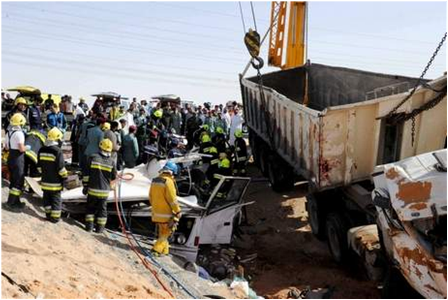The number of road deaths in the UAE is among the lowest in the region but still high compared with western countries.
A new global map shows the UAE with 12.7 road deaths per 100,000 population, compared with 30.4 in Oman, 24.8 in Saudi Arabia, 16.5 in Kuwait, 14 in Egypt and 13.2 in Qatar. In the region only Bahrain had fewer, with 10.5.
Regional figures are much higher than in countries such as the UK, which has 3.7, or Sweden, which has only 3.
“A tremendous amount of work has been done since a road-safety campaign was launched in 2010 but more needs to be put in place to drive it down to those leading countries in the world,” said Simon Labbett, regional director in Abu Dhabi for the Transport Research Laboratory, the UK consultancy.
“The reason those countries are low is because they’ve been doing it for decades longer. It takes a long, long time to bring your casualty rates down to less than five.”
Abu Dhabi began an educational and legislative campaign in 2010 to reduce road deaths and the results have been noticeable.
The Health Authority Abu Dhabi puts the number of road deaths per 100,000 people at 22.4 in 2009, 15.1 in 2010, 13.6 in 2011 and 12.5 in 2012, the most recent calculation available. The figure of 12.7 is for the country as a whole.
The Roads Kill map was compiled by the Pulitzer Centre in Washington D C based on statistics from the World Health Organisation. “What we wanted to do with Roads Kill was allow people to explore on their own, but also provide a narrative,” said Dan McCarey, the centre’s web developer.
A study last year by Prof Fikri Abu-Zidan of the department of surgery at UAE University found that only 1 per cent of back-seat passengers, 11 per cent of front-seat passengers and 26 per cent of drivers involved in accidents in Al Ain were wearing seatbelts.
Seat belts should be compulsory for back-seat passengers, Prof Abu-Zidan said. “If you have an impact, the people in the back become flying bullets. To reduce the maximum injury, you have to make sure everyone is fixed in the car.”
Last year Dubai Police asked the Ministry of Interior to introduce a law to require back-seat passengers to wear seat belts.
Prof Abu-Zidan said there also needed to be greater enforcement of the existing rules on seat belts.
“The problem in the UAE is not the law, it’s the enforcement,” he said. “I’m not sure how often people are fined because of seat belts.”
He said the progress on reducing deaths from accidents was due largely to increasing use of speed cameras.
“That has had a major effect but more emphasis needs to be on seat belts now,” he said.
“By controlling speed, and by controlling seat belts, we will reduce fatalities by 75 per cent.”
To see the global statistics map, visit roadskillmap.com.



